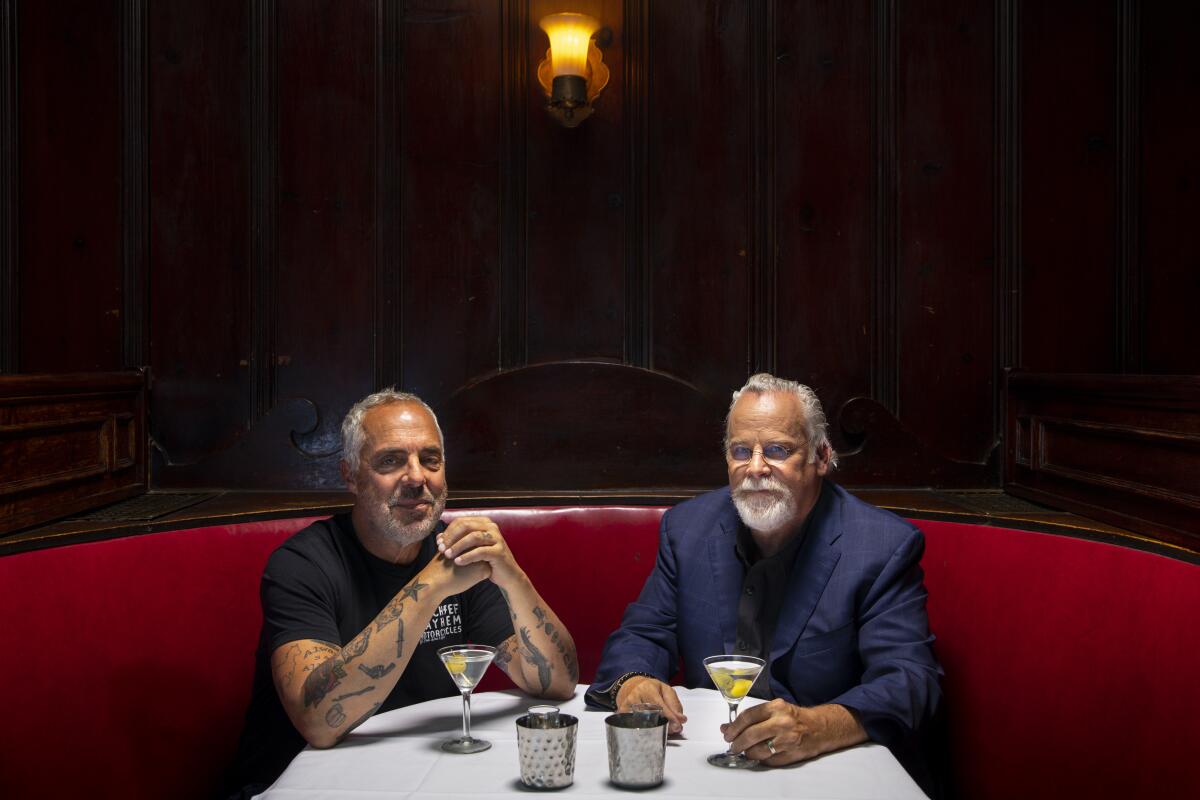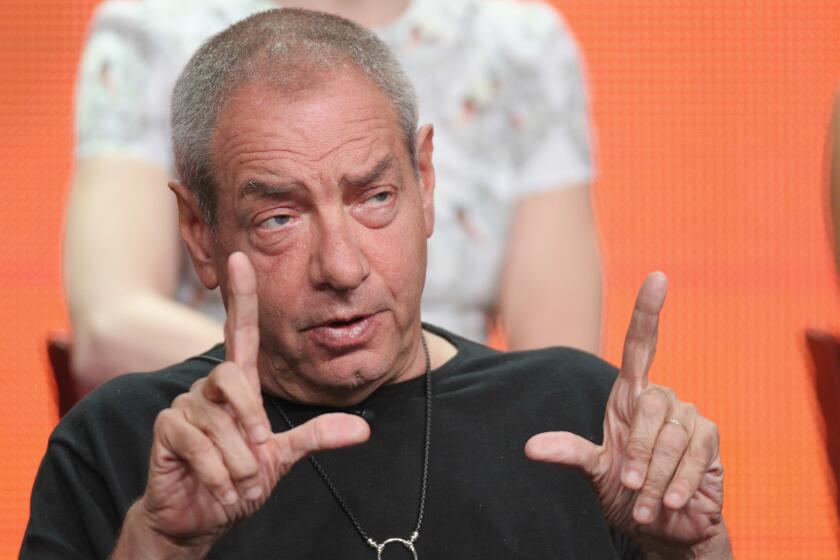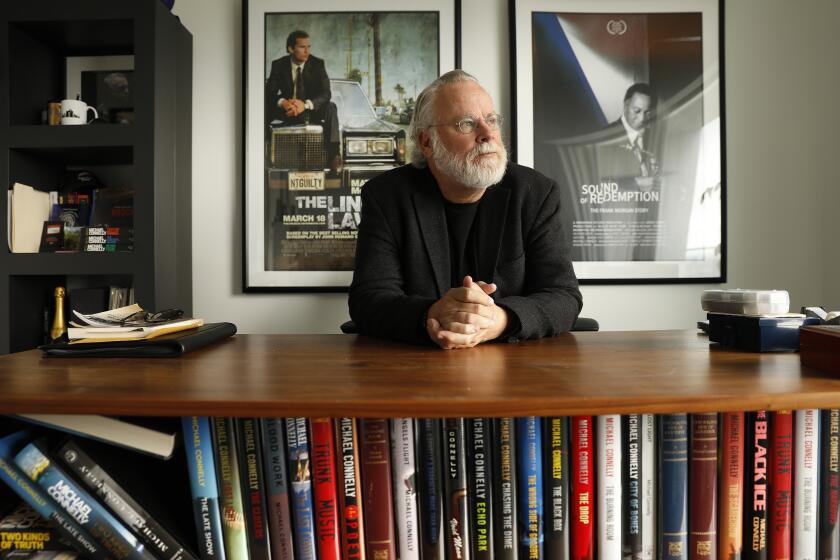TV’s hero cops are under scrutiny. But ‘Bosch’ knew the system was broken all along

- Share via
The following contains spoilers from the final season of “Bosch.”
Almost a decade has passed since no-nonsense LAPD detective Hieronymus “Harry” Bosch first leapt off the pages of Michael Connelly’s bestselling novels and began making his way to television. In six seasons of “Bosch,” the world-weary investigator has waged war against numerous bad guys, crooked politicians, corrupt cops and shady lawyers while wrestling with his own personal demons.
Bosch’s jump to the screen required a leap of faith for his creator. Frustrated after years of failed efforts to launch a Bosch film franchise with major studios, Connelly rolled the dice on a then-unproven format called “streaming,” signing on with online retailer Amazon to develop a series centered on Bosch. Casting Titus Welliver in the title role was another risk — although the veteran character actor had appeared in numerous films and TV series, he had never played the lead.
The gambles paid off.
Since its premiere, Amazon has blossomed into a prominent player in the highly competitive streaming landscape, which now includes the likes of Netflix, Hulu and Disney+ and dominates the TV conversation. “Bosch” was an instant hit for the platform and has continued to be a solid performer on Amazon Prime, which also boasts popular and critically acclaimed projects such as “The Marvelous Mrs. Maisel,” “Fleabag” and the recent limited series “The Underground Railroad.”
Tour L.A. through the eyes of novelist Michael Connelly’s relentless detective, Harry Bosch.
While bringing more dimension to Bosch’s journey fighting crime and corruption, introduced in 1992’s “The Black Echo” and featured in 21 other novels to date, the film noir-flavored “Bosch” has also showcased the vast and diverse communities of Los Angeles that are not always frequented by tourist buses.
Much of “Bosch” is filmed on location, with stories centered in Monterey Park, East Los Angeles, Hollywood and other neighborhoods. Scenes have been filmed at the iconic Musso & Frank Grill and Angels Flight as well as subterranean tunnels, pop-up food trucks and taverns such as the Smog Cutter and Crenshaw Bar & Grill. Plus, episodes are filled with panoramic views of the city. Anyone who doesn’t want to visit L.A. after watching “Bosch” should check their pulse.
The seventh and final season of “Bosch” premieres Friday, marking a crossroads in Bosch’s crime-fighting career. The death of a 10-year-old Latino girl in an arson fire impacts him deeply, harking back to his credo of “Everybody counts or nobody counts.” He’s becoming more frustrated with bureaucracy. And he’s dealing with his daughter Madeline (Madison Lutz), who is moving into adulthood.
But although this chapter is ending, Connelly is not closing the book on Bosch.
The author and former Los Angeles Times police reporter has just started work on a spinoff that will premiere at an unannounced date on Amazon’s free streaming service, IMDb TV.
Set about 18 months after the “Bosch” finale, the new series finds the former cop working as a private investigator, teaming up with his former adversary, attorney Honey “Money” Chandler (Mimi Rogers) to fight for justice. Madeline will have her own struggles as she joins the LAPD as a new officer.
Fans of the novels can also take a deep breath: Connelly will continue to write about his hard-boiled creation. He’s also working on a Netflix series based on his “The Lincoln Lawyer” novels.
Connelly and Welliver settled into a booth at Musso & Frank recently over sand dabs and filet mignon to discuss their favorite memories of “Bosch” and their excitement about continuing his saga. Their affectionate chemistry was on display as they teased each other about their varying movie tastes (Connelly, an unabashed fan of Steven Seagal movies, referred to Welliver at one point as “Mr. Criterion Collection”).
They also addressed the controversy that erupted around police shows last summer in the wake of the murder of George Floyd, and the importance of Los Angeles as a character in the series.
Critics say the popular TV shows of “Law & Order,” “Chicago PD” and “FBI” creator Dick Wolf create harmful misperceptions of the criminal justice system.
You were into streaming before it was cool. It has to be great to see how major streaming has become, and how “Bosch” was on the ground floor.
Michael Connelly: It’s changed culture. This was the first drama that Amazon commissioned. It’s amazing to see what they’ve become, and we were able to hitch ourselves on to that wagon. When I said in 2012, “Let’s do this,” there were those who said, “Are you sure? You’ve invested 20 years writing about this guy, and you’re going to give this to a company who say they’re going to do great things?” It was a shot in the dark.
In 1993, I sold my first two books to Paramount hoping to get a two-hour movie to explain who Harry Bosch was. Instead of a two-hour movie, we’ve now got 68 hours of digging into Harry with this guy [pointing to Welliver]. We got the right people involved. If this had been a network show — I’m not trying to offend Titus — he would not have been cast. It had to be something like Amazon that got us the guy who should be Harry Bosch.
Titus Welliver: When they first came to me, I didn’t know enough about streaming. I thought, “This is a brave new world.” The process of making the show was no different than making any other show. The difference was we were given more artistic license. We had the luxury, the privilege to shoot one-hour episodes like they were one-hour movies, rather than doing the standard thing of “Here’s the establishing shot of the exterior.” I’ve got directors of photography, friends of mine who are in that world, who say, “This might be one of the best-shot shows of all time.” We were able to slow-roll and slow-roast the stories so it would gestate properly the way you experience one of Mike’s books.
Take a tour of the iconic L.A. spots (and stand-ins) in HBO’s “Perry Mason,” from Aimee Semple McPherson’s Angelus Temple to Ptomaine Tommy’s and Angels Flight.
The city of Los Angeles is front and center in the show, but it’s also become a record of what L.A. used to be. A lot of the places that were featured in the show don’t exist anymore.
Connelly: The show really is a snapshot before a lot of changes occurred. We filmed the show during the pandemic. There are some precursors to the pandemic, but we were kind of stuck with what we had. There’s no George Floyd, and he’s had such an impact on the police department. So all this offers a springboard into the next show.
As for Los Angeles, the show is about the city and the city is emblematic of our society. We can’t just show Musso & Frank and Pink’s Hot Dogs without talking about the other aspects of what it’s like to live here. We’ve built up a trust where we can do this, that we can go to these places and deal with these different subjects. Everyone in the city faces them, some more than others. So for me, it’s such a great opportunity that we’ve got this second show. We’re going to have a 24-year-old white girl being a cop in L.A. post the George Floyd murder. We have real cops on our show and we know that has changed the department, and we will be able to show that. This season will be a springboard to what’s coming.
Welliver: It’s like you’re looking at Mt. Whitney and you see the thunderheads and you say, “Oh, damn. It’s either going to get here or not get here, but where it is now is very real. It’s knocking the power out.” There’s an undercurrent of change that you feel in this final season. It’s not just change in the character. It’s a change in the environment.
Connelly: Harry’s mission is about what’s wrong with the system. He quits the police department because he can’t take it anymore. He didn’t have to see George Floyd happen to know what’s going on. He decides, “I’ve got a mission in life. I’ve thought for 25 years this was the way to do it. Now I see it isn’t and I’m out of here.”
During the Black Lives Matter protests last year, there was a lot of criticism of television shows about police, particularly shows that portray cops as heroic. They complained those shows give an unrealistic picture of the tensions between police and the Black community.
Connelly: I know there’s a thing in the media about glorifying cops on these shows. But I never thought we did that. My conscience is clear on that.
Welliver: We’ve never done that.
‘Fair Warning,’ Connelly’s latest, sends ex-L.A. Times journalist Jack McEvoy into a nonprofit news-gathering organization. The author talks shutdown.
What’s the reaction from police to the show?
Welliver: Cops come up to me and say, “I love your show. It completely gets it right. It is real.”
What about people who are not police?
Welliver: I have had a few people say to me, “Do you really want to continue to play this character?” I tell them, “Why the hell not?” He’s got a flawless moral compass. His credo is, “Everybody counts or nobody counts.” Can you get more centered than that? Just because he might be circuitous sometimes in obtaining justice for the victims, he is not a guy who would ever beat a confession out of somebody, plant evidence on somebody or pull someone over based on the color of their skin or their religion or sexual preference. That’s just not who he is. Our show is about people, the human condition, and how people evolve or devolve based on junctions in society and what life brings them. It just so happens that he’s a cop.
So how does it feel, Mike, to have all of this happening?
Connelly: I was going to be an engineer, build houses. I’m about to turn 65, and I’ll have two TV shows in production. It’s hard for me to get my mind around that.
More to Read
The complete guide to home viewing
Get Screen Gab for everything about the TV shows and streaming movies everyone’s talking about.
You may occasionally receive promotional content from the Los Angeles Times.









